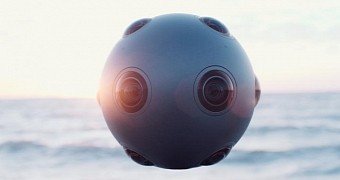Nokia is currently working at a camera professional-level camera capable of filming a 360-degree video and spatial audio.
After having its mobile market bought by Microsoft, Nokia decided to return to consumer market using virtual reality devices other than cell phones. In this regard, this Tuesday the company launched the Ozo, a next-gen camera for capturing a 360-degree video and audio. Unveiled in Los Angeles, the camera is dedicated to professional content creators rather than regular consumers.
Apparently, the camera will probably be used in tandem with Oculus Rift applications or anything that might need 3D filming. Since 3D movies and gaming industry is evolving at a very fast pace, camera manufacturers with Facebook making a very profitable investment in buying the Oculus Rift-making company Oculus for $2 billion, and many other tech giants starting to make serious investments in VR technology, Nokia wants to ride a very popular trend these days.
However, Nokia isn't alone in producing popular 360 degrees cameras, since GoPro also announced its future contribution to VR filming devices, while Panono still remains the most popular 360° x 360° camera available.
The Phoenix rises slowly
Ozo represents Nokia's attempt to return to the consumer market, signaling a new track the company has decided to follow after its smartphone industry has been bought away for $7.2 billion by Microsoft.
After many attempts to keep the pace with the smartphone trend a couple of years ago, and refusing to adopt Android while stubbornly staying with Symbian until adopting Windows, Nokia lagged behind too much in software development and saw its clients go away in droves. Remaining with only its network equipment business after the Microsoft acquisition, Nokia decided to grow its cloud business and Here mapping service.
Recently, Nokia managed to buy Alcatel-Lucent with the approval of the European Commission for $16.6 billion to better compete against leading market companies of Ericsson and Huawei.

 14 DAY TRIAL //
14 DAY TRIAL // 